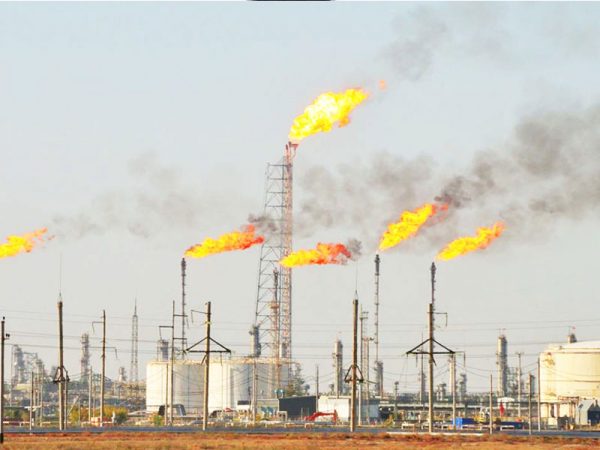
Abbas, at the inauguration of the House ad hoc committee on Gas Flaring on Monday, charged the committee to get to the root causes of gas flaring and make recommendations to end the menace.
He said that the probe is an acknowledgement of the urgent need to understand and mitigate the environmental, social, and economic impacts of this practice.
“The task before this ad hoc committee is a very critical one that lies at the heart of the health of our people and economic well-being of our nation.
“You have been charged with the responsibility of investigating, perhaps, one of the most harmful practices in the oil and gas industry in Nigeria.
“Gas flaring and venting have been a significant environmental, economic, health and social concern in our country for many years.
“The flared gas represents lost revenue that could have been generated through its sale or utilisation. Official records indicate that we lose about 2.5 billion dollars annually to gas flaring,” he said.
He said that as a major contributor to climate change and environmental degradation, gas flaring has direct and indirect impacts on soil, water, and wildlife.
According to him, gas flaring represents a tremendous waste of valuable resources; it is a precious energy source that could be utilised for various purposes, such as electricity generation, heating, or industrial processes.
Earlier, the Chairman of the committee, Rep. Babba Munir (APC-Kaduna State), said that the members were representing the interests of all Nigerians.
He said that the issue of gas flaring had lingered for decades despite several undertakings by oil companies to stop it.
“We are here to give everyone a fair hearing, to know where the loopholes are, where we need to tweak our laws to ensure we get optimal results.
“We do not have to revisit how important it is to our revenue drive needed for infrastructure, security, education and health.
“It is a win-win situation for even the oil companies because if revenues are generated, it is spent on securing our nation, on infrastructure that will better their operations.
“We are insisting and putting our feet down that all agencies of government and oil companies
“Once you are invited, we expect you to come with your full submissions and with the highest representation of your organisation,” he said.
The committee invited Total/Mobil V Domestic wing, Total/Oando JV, Total Energies, African Petroleum Pic., now Ardova PLC, to appear before or on Tuesday at 10 a.m.
Others are Azman Oil and Gas Limited, Matrix Oil And Gas Shata Ltd, Nigerian Electricity Regulatory Commission, National Council on Climate Change and Nigerian Petroleum Development Company.
Also to appear are Yinka Folawiyo Petroleum Company (Aje Oil Field-Offshore), Sterling Oil Exploration & Energy, and Belemaoil Producing Limited.
Walter Smith Petroman Oil Limited, Green Energy International Limited, Millenium Oil and Gas Company Limited, Folawiyo Energy Eroton Exploration and Production Nigeria Limited and Niger Delta Petroleum Resources Ltd.
NAN reports that the Nigerian Oil Spill Detection and Response Agency said Nigeria lost N891 billion to gas flaring in 18 months.
According to data from NOSDRA on August 8, 2022, Nigeria lost a total of N707bn in 2021 and N184bn in the first half of 2022, totalling N891bn.
According to the NOSDRA report, oil and gas companies operating in the country flared a total of 126 billion standard cubic feet of gas in the first half of 2022, leading to a loss of $441.2 million, (about N183.54 billion) in the six-month period.
On the other hand, the agency said, in 2021, about 23,862.271 barrels of oil (3,770,238.864 litres/119 tanker trucks) were spilled.
Giving a breakdown of the gas flared in the country in the first six months of 2022, the agency disclosed that while companies operating in the offshore oilfields flared 62.2 billion SCF of gas, companies operating onshore flared 63.9 billion SCF of gas, valued at $223.6 million.
In 2021, there were around 382 publicly available oil spill records. Out of the 382 occurrences, a total of 33 of these oil spill sites were not visited by a joint investigation team, and 122 of these had no estimated quantity of oil spilled provided by the companies involved.
Two major oil spills were recorded in 2021, with over 250 barrels spilled into inland waters and over 2,500 barrels spilled on land, swamps, shorelines, and the open sea, the report said.
A total of seven medium oil spill incidents were recorded in 2021, with 25-250 barrels spilled into inland waters, or 250-2,500 barrels spilled on land, swamps, shorelines, and the open sea.
In terms of minor oil spills, about 239 cases were recorded with up to 25 barrels spilled into inland waters or 250 barrels on land, swamps, shorelines, and the open sea.
(NAN)




